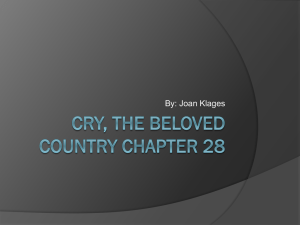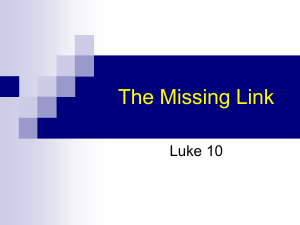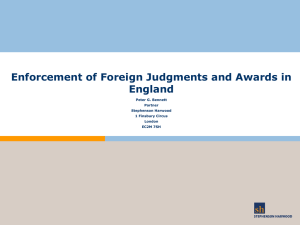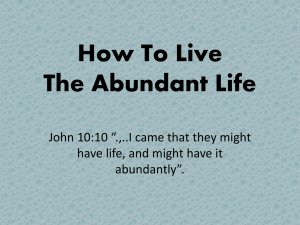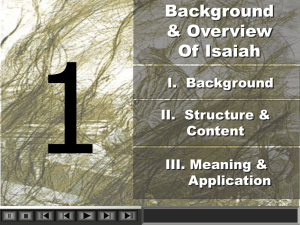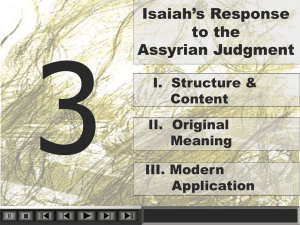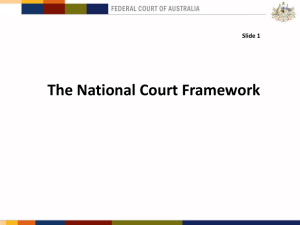- Oregon Conference
advertisement
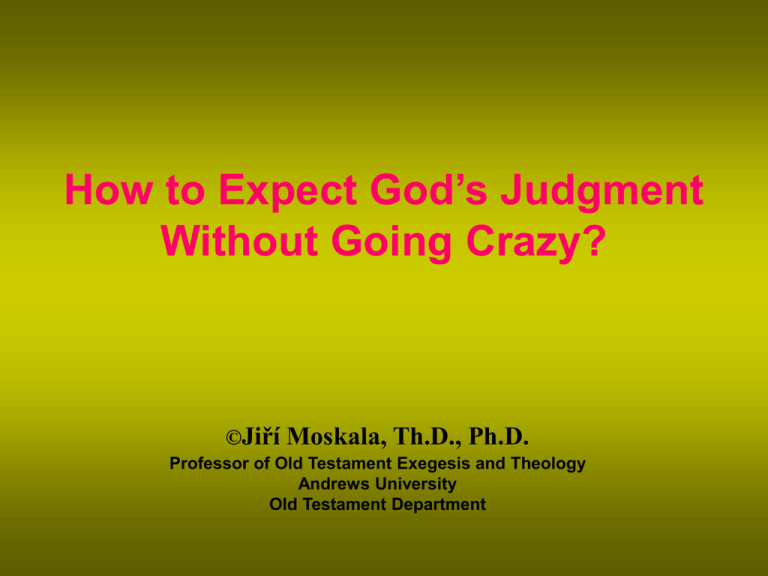
How to Expect God’s Judgment Without Going Crazy? ©Jiří Moskala, Th.D., Ph.D. Professor of Old Testament Exegesis and Theology Andrews University Old Testament Department In the heart of the Eternal Gospel and at the core of our sanctuary doctrine (the 1844 message) is the concept of Judgment! It is the heartbeat of Adventism! Revelation 14:6–7 Then I saw another angel flying in midair, and he had the eternal gospel to proclaim to those who live on the earth—to every nation, tribe, language and people. He said in a loud voice, “Fear God and give him glory, because the hour of his judgment has come. Worship him who made the heavens, the earth, the sea and the springs of water.” The First Picture of God in the Bible God is presented as the Creator! What is the Second Picture of God in the Bible? What is the Second Picture of God in the Bible? God is the Judge! God is our Judge (Gen 3); and within this designation God is presented as our Savior (Gen 3:15)! The Central Theme and Biblically Pervasive Doctrine God being our Judge is not a peripheral teaching in the Bible, but it lies at the center of its message right from the beginning. It is God’s pattern of relating to humanity. Consider examples in the book of Genesis: - Gen 3: the first record of God’s judgment occurred in the context of the Fall. - Gen 4: the second account on judgment is in the story of Cain. - Gen 6–9: judgment expressed in the midst of the Flood story. - Gen 11: judgment on the builders of the Babylonian Tower. - Gen 18–19: God’s judgment on Sodom and Gomorrah. Allow me to be more personal: What are your first thoughts when you hear the word JUDGMENT? What is your feeling? What is your first impression, first reaction? BE HONEST and do not speak theologically! Our Understanding and Impressions 1. Fear 1. Fear 2. Condemnation 1. Fear 2. Condemnation 3. Punishment 1. 2. 3. 4. Fear Condemnation Punishment Destruction 1. 2. 3. 4. 5. Fear Condemnation Punishment Destruction Death Common Element: All is NEGATIVE. My Imagination/View • I had a distorted view, because I grew up in a totalitarian communist regime. • Judge—a person in black with a very serious facial expression pointing at someone with his finger and pronouncing a death sentence over the accused person… Result We see God as a heavenly Nebuchadnezzar who is with His magnifying glass looking at us (like a heavenly policeman) in order to punish us for our mistakes. No wonder that we are scared of God’s Judgment. Thus, we have NO JOY and ASSURANCE OF SALVATION. We are full of fear and anxiety! Why? • For two main reasons. Two Main Reasons • 1. Faulty Definition of Judgment (one-sided; only negative view). • 2. The truth about Judgment was presented/taught in isolation from the rest of the Gospel (at least the connection was not apparent). In other words (stated positively) • In order not to go crazy while expecting God’s judgment: – We need to understand the true nature of judgment (its definition and meaning), – And it must be closely connected with the Gospel as it is in Jesus. What is the Primary Meaning of God’s Judgment? The PRIMARY Meaning of God’s Judgment To JUDGE means: 1. To JUSTIFY―concept of justification. Every time we pray for forgiveness and we are justified by God’s grace, we go through DIVINE JUDGMENT. We are forgiven, acquitted, no more guilty, pronounced just! God’s eschatological judgment breaks through to our time! God as our Judge justifies us sinners! The Primary Meaning of God’s Judgment To JUDGE means: 2. To SAVE―concept of salvation. God saves us from death, and gives eternal life! The Primary Meaning of God’s Judgment To JUDGE means: 3. To DELIVER―concept of deliverance. God delivers us from different addictions to sin! He gives us FREEDOM! The Primary Meaning of God’s Judgment To JUDGE means: 4. To VINDICATE―concept of vindication. God vindicates us against accusations of Satan! God is for us and never against us! Primary meaning All FOUR HAVE A POSITIVE MEANING: JUSTIFY, SAVE, DELIVER, AND VINDICATE Only when we do not accept the positive dimension of God’s judgment are we under the negative meaning of His judgment! (i.e., under a secondary meaning: condemnation, punishment, destruction.) Examples of DIVINE POSITIVE Judgments: 1. The Book of Judges What is the primary function of Judges? • To condemn? • To punish? • To destroy? Main Functions of Judges • To DELIVER God’s people from the oppression of the enemies. They are the liberators! Main Functions of Judges • To DELIVER God’s people from the oppression of the enemies. They are the liberators! • To CARE for them. Main Functions of Judges • To DELIVER God’s people from the oppression of the enemies. They are the liberators! • To CARE for them. • To PROTECT them. Main Functions of Judges • To DELIVER God’s people from the oppression of the enemies. They are the liberators! • To CARE for them. • To PROTECT them. • To SAVE them. The Book of DELIVERERS―they bring FREEDOM. 2. Dan 7:22 “Until the Ancient of days came, and judgment was given to the saints of the most High; and the time came that the saints possessed the kingdom.” (KJV) Correct Meaning of the Preposition “to” - Judgment was given “to” … - Can be misleading: the first impression is that judgment is given to the saints that they will judge (it is wrong!). - Daniel 7 describes the pre-Advent Judgment. - Battle here is for the correct understanding of the preposition “to”. - In Aramaic language of Dan 7:22 is a preposition “lamed,” the so called “lamed of advantage.” - Judgment was given “for” the saints of the Most High, it was delivered into their advantage, for their favor! - Some new translations caught this meaning very well. Dan 7:22 • “Until the Ancient of Days came and pronounced judgment in favor of the saints of the Most High, and the time came when they possessed the kingdom.” (NIV) • “Until the Ancient of Days came, and a judgment was made in favor of the saints of the Most High, and the time came for the saints to possess the kingdom.” (NKJV) David’s Prayer 3. Psalm 7:8–9; 26:1; 35:24; 43:1 (three times David, once the sons of Korah) • • “The LORD shall judge the people: judge me, O LORD, …” (7:8) Of David. “Vindicate me, O LORD, for I have led a blameless life; I have trusted in the LORD without wavering.” (26:1) Psalm 35:24 “JUDGE ME, O LORD my God, according to Your righteousness, and do not let them rejoice over me.” Psalm 82:6 (Asaph) “Rise up, O God, judge the earth …” Your Personal Prayer? How many of you did ever (dare to) pray: “Please, Lord, judge me!”? 4. Psalm 37:38–39 “But all sinners will be destroyed; the future of the wicked will be cut off. The salvation of the righteous comes from the LORD; he is their stronghold in time of trouble.” 5. Psalm 76:8–9 “From heaven you pronounced judgment, and the land feared and was quiet―when you, O God, rose up to judge, to save all the afflicted of the land.” The Flood Account 6. Gen 6–9 Chiastic climax of the Flood Account: Gen 8:1–5: “AND GOD REMEMBERED NOAH.” Gen 6:8: “But NOAH found/received GRACE.” Gen 6:3: 120 years of additional grace. Gen 6:6: “The Lord was grieved [nacham] and His heart was filled with pain [‘atsab].” Theological Essence of the Flood Story Gen 6:11–13 Play on the word shachat: 1. Corrupt 2. Destroy Gen 6:11-13 (used four times) “Now the earth was corrupt in God’s sight and was full of violence. (12) God saw how corrupt the earth had become, for all the people on earth had corrupted their ways. (13) So God said to Noah, ‘I am going to put an end to all people, for the earth is filled with violence because of them. I am surely going to destroy both them and the earth.’” Result God has shachat what was already shachat. God has destroyed what has been already destroyed by humans! God is presented as the Surgeon to cut the cancer of sin out! The world before flood became one big concentration camp―with violence, exploitation, abuse, torture, suffering, etc. If God would not intervene, His promise of the Coming of the SEED to conquer Satan/evil would be never fulfilled. Only 8 people were willing to cooperate with God! God waited to the last minute! To Judge = To SAVE 7. Isa 35:4–5 “Say to those with fearful hearts, ‘Be strong, do not fear; your God will come, he will come with vengeance; with divine retribution he will come to save you.’ Then will the eyes of the blind be opened and the ears of the deaf unstopped.” See also Deut 32:36 and Ps 94:1–3. Judgment and Joy Psalm 96:11–13 “Let the heavens rejoice, let the earth be glad; let the sea resound, and all that is in it; 12 let the fields be jubilant, and everything in them. Then all the trees of the forest will sing for joy; 13 they will sing before the LORD, for he comes, he comes to judge the earth. He will judge the world in righteousness and the peoples in his truth.” See also 1 Chron 16:31–36 (joy, salvation, and judgment are put together). New Testament: 1 John 2:28 “And now, dear children, continue in him, so that when he appears we may be confident and unashamed before him at his coming.” 1 John 4:17 “In this way, love is made complete among us so that we will have confidence on the day of judgment, because in this world we are like him.” parresia = boldness, assurance, confidence Positive Event • God’s Judgment = God’s SMILE for His people Rom 8:31 “If God is for us, who can be against us?” Result: JOY and ASSURENCE of salvation! Judgment as our only HOPE • Only people who are condemned to death (being under the death penalty) can rejoice over the news that there will be a new trial (judgment) for their case!!! • When you know that you are condemned to eternal death because of your sins, you rejoice over God’s new judgment on your behalf! A new trial is your only hope! Chance for sinners to be saved! All depends on our relationship to our Lord and Savior! Today’s Court System • Judge (against you; judging you) • Attorney (for you; defending you) • Two different persons with each doing a different function! • Plus: Prosecutor (expresses accusations against you; accusing you) Court System in Ancient Israel - There were no attorneys. A judge was at the same time an attorney. Only ONE PERSON for both functions. The judge was perceived as the savior. You had to go to the judge to be delivered from injustice and vindicated. - The Day of Judgment is the Day of Salvation. • We need to train our minds to think positively about God’s judgment. • Only when the positive meaning does not make sense will then the negative aspect of God’s judgment takes place. Rev 14:7 POSITIVE JUDGMENT Rev 14:8 NEGATIVE JUDGMENT AM I RIGHT? Our God does not need to organize a judgment in heaven in order to condemn us. Right or Wrong??? Right! Our God does not need to organize judgment in heaven in order to condemn us. WHY NOT ? We are all sinners! Because we are already condemned to death (we are all sinners)! He does not need to do it for a second time. Main Reason God calls for a judgment in heaven in order to LEGALLY secure our place in heaven for all eternity in front of the whole universe! (Plus He plainly unmasks the powers of iniquity before the entire cosmos!) God is For us! • God is never against us! • Right thinking leads to right actions! • Cultivate a correct thinking paradigm! • Cultivate an awe attitude toward Him, a true REVERENCE toward Him! This leads to an awe experience with Him! • God is judging us in order to justify, save, deliver, and vindicate us! We are saved by the grace of God through faith in Jesus Christ! • This is the foundation of the eternal Gospel. • This is the basic of biblical theology of Judgment. The Only Solution • If someone is condemned at the judgment, it is not because he or she is a sinner (we all have sinned!), but because that person did not accept the solution to his or her situation of sin, namely, Jesus Christ as the personal Savior! • We are saved by grace through faith in Jesus, but judged by our attitude to Christ! Saved by Grace • We are saved not because we feel good, or are good, or feel great about ourselves, but because God said so! • We can feel miserable, and yet we can have full assurance of forgiveness and salvation! • It does not depend on our performance, achievements, works, or obedience, but on God’s word! 1 John 3:20 “For if our heart condemns us, God is greater than our heart, and knows all things.” (NKJV) 1 John 1:7, 9 “But if we walk in the light, as he is in the light,…the blood of Jesus, his Son, purifies us from all sin. “If we confess our sins, he is faithful and just and will forgive us our sins and purify us from all unrighteousness.” Isaiah 1:18 “‘Come now, let us reason together,’ says the LORD. ‘Though your sins are like scarlet, they shall be as white as snow; though they are red as crimson, they shall be like wool.’” Isaiah 38:17 “Surely it was for my benefit that I suffered such anguish. In your love you kept me from the pit of destruction; you have put all my sins behind your back.” Micah 7:19 “You will again have compassion on us; you will tread our sins underfoot and hurl all our iniquities into the depths of the sea. Divine Judgment and the Gospel The Second Vital Issue How to expect God’s Judgment without going crazy? Only by relating the Gospel and Judgment!!! (By putting salvation and judgment together.) How to put together God’s Judgment and the Gospel? God’s Universal Judgment How is divine eschatological judgment usually presented/explained? God’s Universal Judgment: Traditional View It is explained as eschatological judgment in three phases: Which ones? 1. Pre-advent Judgment (from 1844) 1. Pre-advent Judgment 2. Judgment during Millennium 1. Pre-advent Judgment 2. Judgment during Millennium 3. The Final Judgment Am I Right? Vital Question Is this view correct? Is this understanding in harmony with ALL biblical data? YES or NO??? Yes and No! It is right as for the events and dates! BUT WRONG for the starting point! It is right as for the events (the three judgments mentioned above) and the dates like 1844. BUT WRONG for the starting point, because in the year 1844 God’s eschatological judgment did not begin (but only the Pre-advent Judgment)! Let me explain. Crucial Difference There is a difference between the eschatological (end-time) judgment and the pre-advent judgment! - The starting point for the pre-advent judgment is 1844. - BUT: When does start the eschatological (end-time) judgment? When Do the Last Days Begin? - The last days? - The end of the ages? When does the end of the ages begin? Traditional answer: In AD 1798 (1755) or 1844. Right or Wrong? WRONG!!! • Let me prove it from the Bible! • Our faith must be always built on “It is written!” Question: What is written? The Beginning of the Eschatological Time 1. Heb 1:1–2 “In the past God spoke to our forefathers through the prophets at many times and in various ways, but in these last days he has spoken to us by his Son, whom he appointed heir of all things, and through whom he made the universe.” 2. Acts 2:17; Heb 9:26; 1 Cor 10:11; 1 Pet 1:20; 4:7; 2 Pet 3:3; 1 Tim 4:1; 1 Thess 4:16–17. Acts 2:17 “In the last days, God says, I will pour out my Spirit on all people. Your sons and daughters will prophesy, your young men will see visions, your old men will dream dreams.” Heb 9:26 “Then Christ would have had to suffer many times since the creation of the world. But now he has appeared once for all at the end of the ages to do away with sin by the sacrifice of himself.” Is There a Difference Between the Last Days and the Time of the End? The phrase “the time of the end” #qe t[e is a specific exegetical idiomatic expression used only in the book of Daniel referring to 1798 or 1844 (Dan 8:17; 11:35, 40; 12:4, 9). It’s the time of cutting, the time of decision, the prophetic apocalyptic time of the end. Crucial Difference but Complementary General eschatological time was inaugurated from the first coming of Christ (the last days, the end of the ages began, the end time). Specific prophetic/apocalyptic eschatological time of the end: from 1798 and/or 1844 (Dan 7–9, 12). Difference but not Contradictory • The Last days, the End of the Ages, [the End of Time or the End Time] – from the Cross • The Time of the End – from 1798/1844 Crucial Difference but Complementary General eschatological time (the last days; the end of time) Specific prophetic/apocalyptic eschatological time (the time of the end) from 1798/1844 on The Centrality of the Cross Eschatological Time (biblical teaching)—the end time, the last days arrived with the CROSS (the first coming of Christ)! Where does the problem lie? Correct biblical teaching about preadvent judgment and the date of 1844, but the event is isolated from the most crucial point―the CROSS of Jesus or Christ as a Person! HE must be at the CENTER! The Central Place of the Cross • The Cross of Christ, Jesus Himself, must be the starting point of all our discourses on the divine Judgment! • The year AD 31 and not 1844 has to be the foundational and beginning reference point of God’s eschatological judgment! No Dichotomy • There is no dichotomy between AD 31 and 1844. You do not need to choose between them. • They need to be put together in the proper relationship and perspective! • The starting point of God’s eschatological judgment is AD 31! It is a better way to preach about God’s judgment: • It is crucial to connect divine judgment with the Cross of Jesus! • The cross is and must be the CENTRAL event for all our doctrines!!! Please, never, never, never present judgment without the Cross! Serious Matter To preach or teach about God’s judgment and start with 1844 is a grievous sin! Neglect to put Christ at the center results in a religious crime, because people then live in a spiritual schizophrenia. When you read, for example, Dale Ratzlaff’s book on The Cultic Doctrine of Adventism, you understand that he knew only a distorted Sanctuary doctrine which robbed him of assurance of salvation… • As Dr. Davidson mentioned last night that in his early years of pastoral ministry, he thought that if he knew how to prove mathematically 1844 and is able to explain the symbolism of the furniture in the Tabernacle, then he knew the doctrine of the sanctuary… But today it’s different, he helped us to see Jesus at the center of this biblical teaching… • The date of 1844 and the sanctuary furniture are only a framework, a picture frame, but the picture is still missing. • The picture frame is essential and significant, because it provides specific background and gives flavor to the picture, but the most important is the picture itself! Several years ago I preached in Sydney about the pre-Advent judgment from the perspective of the Cross. I put Jesus at the center. When I finished, two pastors said to me… “If the message you presented tonight was preached in Australia 30 years ago, there would be no Desmond Ford Crisis!” From and To the Cross • “The Lamb that was slain from the creation of the world.” (Rev 13:8) The Centrality of the Cross in All our Doctrines “The Sacrifice of Christ as an atonement for sin is the great truth around which all other truths cluster. In order to be rightly understood and appreciated, every truth in the Word of God, from Genesis to Revelation, must be studied in the light that streams from the Cross of Calvary. I present before you the great, grand monument of mercy and regeneration, Salvation and redemption—the Son of God uplifted on the cross. This is to be the foundation of every discourse given by our ministers.” 315 Gospel Workers, p. The Centrality of the Cross “Of all professing Christians, Seventh-day Adventists should be foremost in uplifting Christ before the world.” GospelWorkers, p. 156 Divine Universal Judgment in Seven Phases: Celebration of the Cross of Jesus Eschatological/Post Cross Judgments 2 Pre-Cross Judgments 1 7 3 4 5 6 God’s Executive Judgment Remember! God - as your Judge - is for you and never against you! He smiles on you! He is always ready and able to justify, save, deliver, and vindicate! He needs to be always at the center of our discourses on judgment! Let’s praise Him for His goodness, and faithfulness! Hosanna, glory, and halleluiah to our loving, gracious, and holy Judge! Amen. Toward a Biblical Theology of God’s Judgment: A Celebration of the Cross in Seven Phases of Divine Universal Judgment (An Overview Of a TheocentricChristocentric Approach) (For more details, see my article in Journal of Adventist Theological Society, Spring 2004).

